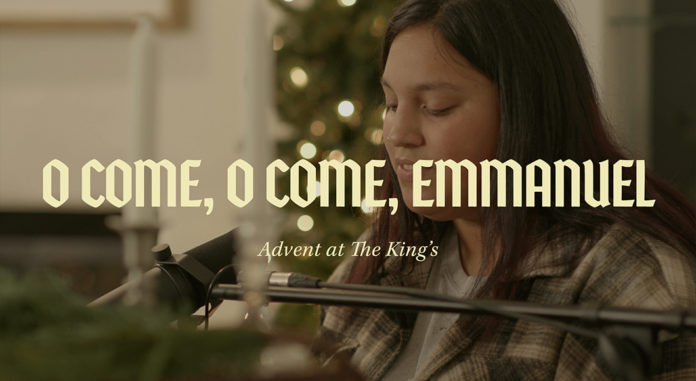Editor’s note: We’re spending the month of December taking a deep dive into some of our favorite Christmas songs. Watch as The King’s University’s Dr. Daniel Davis explains the history and the significance of these songs, which are performed by students in TKU’s Worship Leadership program.
When I think of Christmas, I think of laughter, bright wrapping paper, warm crackling fireplaces, food, and beautiful lights. I think of home and family. It is a joyous occasion filled with wonder and memories made and in-the-making.
But before Christmas is Advent. Advent is the season of four weeks before Christmas in the Christian calendar. It is a season of preparation and anticipation of the celebration of the Nativity of our Lord.
Most of us can relate to identifying anticipation with the weeks before Christmas. We look forward to a break in our routine of work or to the gifts under the tree or to going home to friends and family. We anticipate the celebration.
Anticipation is one of those strange sensations we have that is both painful and pleasant. On the one hand, it is painful because we do not yet have what we are wanting. When we anticipate, our souls are stretched tight in desire. Sometimes, like the stretching of a muscle, that tension is so strong we can hardly stand it. A great picture of that tension is the antsy not-so-patient waiting of a child as the magical night of Christmas Eve draws near. The little boy wants it so bad it hurts!
The stretching of our soul in anticipation is also pleasant. We want to feel it. We want to anticipate. Gifts are wonderful, but even more so when anticipated. The pleasantness we experience in anticipation is rooted in what the word means. It comes from the Latin, anticipatio, which is the compound of two words: ante and capet. Ante means before and capet means head. The idea is that we take possession beforehand in our minds what is to come later. We stretch out with our hearts and imagination to lay hands on the desired object lying in our future. That is the source of both the pain and pleasure of anticipation: we do not have it, but we can hope for it.
Advent is a season of triple anticipation as we participate in a longing of past, present, and future. When we sing and pray through Advent, we relive the longing of Israel for the Messiah who would rescue the nation and set the world to rights. We also recall our own longing for Messiah to shine now in our hearts in the warmth of His Spirit. Finally, we ache for Messiah to return and consummate the renewal of all things.
This triple anticipation is why the well-known Advent song, “O Come, O Come Emmanuel” is accompanied by such a haunting tune. “O Come, O Come Emmanuel” was written for this season and captures the themes of the Church’s prayers of anticipation. The song draws upon the language of Israel to pray for the coming of Messiah who is the hope of all the world. It is the song of those who know winter’s shadows and look for the dawn of the Sun of Righteousness. The song gives voice to the ancient and present cries for help.
We all understand this cry of longing and plea for help. It is the cry that springs from both disappointment and hope. From the bitter knowledge of what has been and the anticipation of what should be and what will be.
It is the cry of Israel for restoration and renewal.
It is the cry of the mother and father at the graveside of their child.
It is the cry of the husband or wife rejected for another.
It is the cry of the child abused and neglected.
It is the cry of marginalized and oppressed people.
It is the cry of the heart wrung by depression and pierced by anxiety.
It is the cry of all who sit in darkness and the shadow of death: “O Come thou
Dayspring from on high; cheer us by Thy drawing nigh; disperse the gloomy clouds of night; and death’s dark shadows put to flight.” It is the cry made from pain looking to promise. The Apostle Paul tells us that we do not grieve as others grieve, for we have hope. Though our Advent season may stretch our souls, (and in this way Advent season might be any time of year), there is yet a pleasure in the longing. Though we would rather not have pain, and that is understandable we can still have hope in the midst of pain. We grieve, knowing that what is should not be. But we also know that it will not be.
Emmanuel, God-with-us, shall come to strengthen our hearts. And more than that, He shall come to fulfill our hope. Then as St. Julian of Norwich has said, “All will be well and all will be well and all manner of things will be well.”

